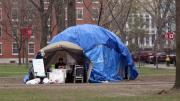Occupy Harvard’s geodesic dome and information tent, the last remaining physical structures of the protest movement that began on November 9 and decamped in December, have been removed from the Yard by administration officials. Faculty of Arts and Sciences spokesperson Jeff Neal cited safety concerns as the primary reason for the administration’s decision, specifically mentioning an incident in Harvard Yard last Friday, January 13, when high winds blew over Occupy Harvard’s information tent and the geodesic dome was lifted up and carried several feet, nearly striking one person and endangering others passing through the Yard.
“The University determined that both structures presented safety risks, and the group was asked to remove them,” Neal wrote in a statement e-mailed to Harvard Magazine. “Phillips Brooks House provided space for storage of their materials, and members of the facilities staff assisted in cleaning up the site. In addition, the group was told that the University would work with them to find more appropriate space for their information table. Staff dismantled the dome after the group declined to do so despite the ongoing safety risks presented by the continuing high winds.”
According to the Occupy Harvard website, after the dome collapsed and moved about 15 feet, protestors responded and began trying to restore the structure to its original location, but were halted by University officials demanding the dome be dismantled immediately. When the occupiers at the site refused, a facilities crew, accompanied by Cambridge police and Harvard officials, “seized the dome, walked it to the northeast corner of Harvard Yard, and began the dismantling process out of general eyesight.”
“After we righted the dome we were approached by the grounds manager, who had been in contact with administration and who told us that we had always been ‘good neighbors’ in his view,” Fenna Krienen, a Faculty of Arts and Sciences graduate student and member of Occupy Harvard’s media team, wrote in an e-mail to Harvard Magazine. “He explicitly told us that if we took action to stake the dome to the ground, there would be no problem with our continued encampment. We were in the process of doing so when administration delivered their demand for dismantlement and subsequently seized our property.”
In response to the removal of the tent and dome, the Occupy Harvard “crafts working group” met last weekend to create tiny paper tents to decorate the former site of the encampment, aiming “to leave visual and symbolic evidence of our objection to the removal of our dome so that those who pass through the Yard in the coming days can better appreciate what transpired.”
“We do not believe that the seizure of our dome by the Harvard administration was justified,” the movement wrote on its website on January 15. “We continue to call for Harvard to make good on its commitment to support free speech on campus.”










